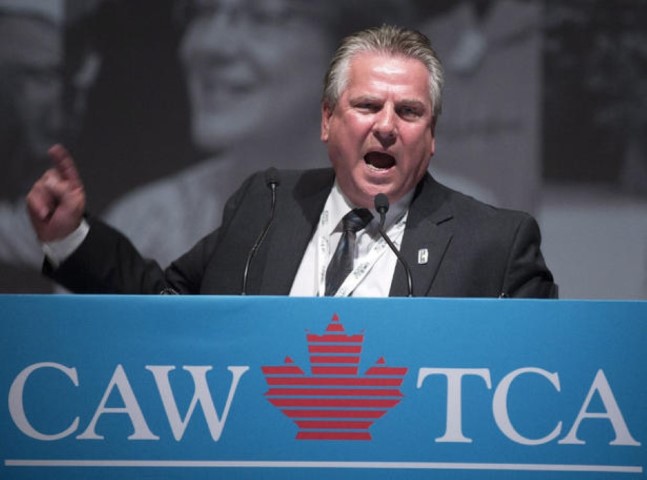GM, CAW reach tentative agreement on new labor pact
- Written by
- Published in News
- font size decrease font size increase font size
- Be the first to comment!
Deal adds, preserves 1,750 jobs, as well as future Impala output, union says
 The Canadian Auto Workers reached a tentative labor agreement with General Motors that the union said will secure new investment, preserve jobs and delay the shutdown of a major assembly line.
The Canadian Auto Workers reached a tentative labor agreement with General Motors that the union said will secure new investment, preserve jobs and delay the shutdown of a major assembly line.The settlement covering wages and benefits for about 8,200 workers followed a day of back-and-forth negotiations between the union and the U.S. automaker.
"In today's economy, in today's market share, it meets our goals," CAW President Ken Lewenza said following a marathon 30-hour bargaining session.
Rank-and-file approval of the contract would ensure continued production of such Canadian-built vehicles as the Chevrolet Equinox, Camaro and Impala.
In addition to the Chevrolet models, GM builds the GMC Terrain, Buick Regal and Cadillac XTS in Canada.
The union said the proposed four-year deal will add or maintain 1,750 jobs -- a key objective of CAW officials during labor talks this year with Detroit automakers.
GM has pledged to invest C$675 million in Canada over the life of the agreement, CAW officials said.
 Lewenza said GM has agreed to add a third shift on the flex line at its Oshawa, Ontario, assembly plant early next year, which will create or maintain 900 jobs.
Lewenza said GM has agreed to add a third shift on the flex line at its Oshawa, Ontario, assembly plant early next year, which will create or maintain 900 jobs.GM will also delay the closing of a consolidated production line at a plant in Oshawa until June 2014, Lewenza said.
In June, GM announced plans to shutter the line in 2013, affecting about 2,000 jobs.
The line currently builds the Impala, which will be redesigned next year and assembled at GM's Detroit-Hamtramck plant.
CAW officials said GM has agreed to build the all-new Impala in Oshawa, as well.
Under the pact, Lewenza said GM will build the next-generation Impala on one shift, employing about 750 workers. Production could be increased to two shifts in 2014, he added.
The union said GM also will add or maintain another 100 jobs as part of new investments planned at its St. Catharines, Ontario, engine and powertrain manufacturing operations.
Like the UAW, which negotiated new labor pacts with Detroit's 3 automakers in 2011, the CAW has pressed for new jobs, employment security and future product commitments during the talks with the companies.
But Lewenza told journalists his biggest disappointment during the GM negotiations was that the union wasn't able to secure output of a new vehicle.
"When you're in market share decline, you can't win a product," he said.
"Needless to say the master bargaining committee entirely tried to get new product... but GM made it clear they don't need the capacity or have the products [at this time]," Lewenza said. "But, at any time during this collective agreement, if GM shows increase in market share, we have the investment there and tools to move fast."
"Don't waste that investment. Don't waste that floor space," Lewenza said, referring to GM.
Canadian bailout
The union represents about 21,000 workers at Ford, GM and Chrysler. Canada accounts for about 16% of all the light-vehicles the three automakers assemble in North America.
But the strong Canadian dollar and concessions the automakers secured a year ago from the UAW have undermined the competitiveness of Canada as a manufacturing base.
Lewenza said the GM pact should help maintain the automaker's fixed costs at current levels and put the union in a competitive position to win future investments.
"That was our goal," Lewenza said.
GM, which received financial support from the Canadian and Ontario governments as part of its 2009 bailout, suggested the deal addressed its competitive needs against an unfavorable macro-economic climate.
"This set of talks with our labor partner have been candid and constructive, reflecting the challenges facing Canadian manufacturers," David Wenner, general director of labor relations for GM of Canada, said in a statement.
The company declined to comment further on specifics in the plan, pending a ratification vote.
The union reached a tentative labor pact with Ford Motor Co. on Monday that it is using as a pattern for deals with GM and Chrysler.
The Ford agreement mostly eliminates cost-of-living raises for workers and retirees. Ford agreed to create about 600 jobs, including a partial third shift at a vehicle-assembly plant in Oakville, Ontario, the union said.
Ford workers will receive C$2,000 ($2,046) lump-sum payments annually in later years, in lieu of raises, and a C$3,000 ratification bonus upon approval of the deal.
The union said cost-of-living adjustments would be suspended until June 2016.
Voting on the Ford deal is scheduled for this weekend and the results are expected late Sunday, the union says.
Chrysler negotiations continue
Negotiations between the CAW and Chrysler Group LLC are continuing.
Chrysler is the smallest of Detroit's automakers but has one of the largest active payrolls and manufacturing footprints in Canada, where it builds minivans and large sedans.
Lewenza on Thursday warned the union would provide strike notice against Chrysler if a deal can't be reached.
"To the Chrysler workers we represent in Canada: Be patient. I hope the patterns established will give Chrysler the confidence," Lewenza said. "We're not fearful of providing a strike notice. If Chrysler is going to resist that pattern we may have to use that tool."

